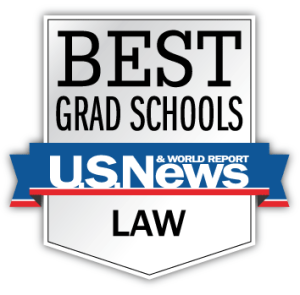Has Yale Changed The Law School Rankings Game?
How will most of the T14 schools spurning U.S. News change the legal profession?
 The dust is finally starting to settle on the biggest news in law school rankings in decades. It began two weeks ago, when Yale Law School announced it would be withdrawing from participation in the U.S. News & World Report law school rankings system. Given that Yale has been at the No. 1 spot in those rankings since their inception over 30 years ago, the move initially caused many in the legal world to scratch their heads. Imagine Meryl Streep announcing she would no longer participate in the Oscars, or the Yankees refusing to take part in any more playoffs, and you’ll have a sense of how bizarre Yale’s decision might seem to some.
The dust is finally starting to settle on the biggest news in law school rankings in decades. It began two weeks ago, when Yale Law School announced it would be withdrawing from participation in the U.S. News & World Report law school rankings system. Given that Yale has been at the No. 1 spot in those rankings since their inception over 30 years ago, the move initially caused many in the legal world to scratch their heads. Imagine Meryl Streep announcing she would no longer participate in the Oscars, or the Yankees refusing to take part in any more playoffs, and you’ll have a sense of how bizarre Yale’s decision might seem to some.
In the wake of Yale’s decision, at least nine other law schools have subsequently announced their own withdrawals from the U.S. News rankings system. This includes the majority of the T14 schools that have dominated the rankings for decades, including Stanford, Harvard, and Columbia. Dissatisfaction with the U.S. News rankings has been building for years at the top of legal academia, and Yale taking the first step gave other schools the cover to make their own withdrawals, as well.
Why Quit When They’re Ahead?

Legal Contract Review in Under 10 Minutes? Here’s How
The reasons the law schools have given for their rankings exodus are varied but mostly come down to variations on the theme that the U.S. News rankings collectively do more harm than good for our profession. Yale Law School Dean Heather Gerken cited as an example how the rankings systematically penalizes programs that encourage students to move toward public-interest careers.
The U.S. News rankings place a premium on law schools’ employment numbers for their graduates. When some underperforming schools tried to game the system by “hiring” their own graduates when they were unable to find gainful employment, the U.S. News stopped counting school-funded positions towards a schools’ employment numbers. Per Gerken, this meant that Yale was punished and disincentivized from its longstanding practice of funding a number of highly competitive fellowships in public-interest fields. The U.S. News rankings were forcing the school to choose between keeping its metrics high or honoring its mission to serve the world, so Yale chose to stop chasing the U.S. News numbers.
For most of the schools announcing their withdrawal from the U.S. News rankings process, their stated reasons were variations on that same theme. The U.S. News rankings play a huge role in law school applications and admissions decisions for students, and so the U.S. News metrics inherently distort law schools’ decision-making to keep their numbers high. Even worse, the rankings can incentivize schools to publish inaccurate, distorted, or fabricated data. Just a couple months ago, scandal struck Columbia University (the college, not the law school) when it dropped from No. 2 to No. 18 in the U.S. News College rankings after submitting overly rosy data for years.
The Defenders Of The Status Quo
Sponsored

How Thomson Reuters Supercharged CoCounsel With Gen AI Advances


Data Privacy And Security With Gen AI Models

Curbing Client And Talent Loss With Productivity Tech

Curbing Client And Talent Loss With Productivity Tech
The response from legal academia has not been universally in favor of the exodus, however. The University of Chicago Law School has emphatically stated it will not be withdrawing from the U.S. News rankings reporting system, noting that much of the data the U.S. News system relies on is publicly available, and the remainder is information it claims it has “no reason to withhold.”
Chicago’s response raises a salient point — Yale, Harvard, and the like are not simply going to disappear from the U.S. News rankings. They’ll just be ranked using “placeholder values,” which will likely result in them dropping several slots. The rankings will continue to exist, they’ll just arguably have worse information about some of the schools at the top.
Some of the U.S. News rankings defenders also note that even if 10 or more of the top law schools stop participating, that’s only about 5% of the 196 schools listed in the rankings, and most of those schools are acknowledged as being near the top of the pack. There are plenty of law schools that don’t have storied, elite pedigrees to rely on to attract applicants, but that can still offer a great education for aspiring attorneys. Those schools rely on the U.S. News rankings to attract students, and their students rely on the rankings in making their decisions. If I told you that Lexington State’s law program had made huge improvements over the past 10 years, how would you check whether I was right other than going to the U.S. News rankings and seeing whether they’d improved? Having objective criteria to measure schools by can provide value, even if those criteria are the subject of deep, valid criticisms.
For those who already tried to look it up and couldn’t, yes, Lexington State Law School doesn’t exist. But the fact you thought it did and knew where to go to learn about it underscores the point that the rankings have at least something to offer.
What Comes Next?
Sponsored

Legal Contract Review in Under 10 Minutes? Here’s How

Tackling Deposition Anxiety: How AI Is Changing The Way Lawyers Do Depositions
My head and heart say this exodus from the top is probably an overall good thing. The culture of law is heavily informed by concepts of ranking and prestige, largely to our detriment. Students are willing to abandon schools that fit them better academically for schools with a higher slot in the rankings. They take jobs that they know will make them miserable because the firm’s Vault rankings are great. I’ve seen highly qualified employment candidates get turned down and marginal candidates get enthusiastically hired based on the school they went to. The U.S. News rankings give helpful structure and order to assessing legal academia, but too often they short-circuit our thinking and prevent us from making more rounded, holistic decisions.
The real question, then, is whether these withdrawals spur meaningful change in the system. It’s possible the attention these actions bring to the flaws of the U.S. News ranking system lead to newer, better methods of comparing law schools, which would be a win for all involved. If U.S. News decides to simply dock the withdrawing schools a few positions and carry on as usual, that would be its right, but also would seem like a wasted opportunity for reflection and growth.
Academia has been wrestling in recent years with its relationship to rankings, lists, standardized tests, and other putatively “objective” criteria that may help or harm students in equal measure. If nothing else, it’s admirable to see some of the chief beneficiaries of a system calling out its flaws rather than blindly accepting its accolades. We’re probably never going to get this balance just right. But we can keep working to make it better.

James Goodnow is the CEO and managing partner of NLJ 250 firm Fennemore. At age 36, he became the youngest known chief executive of a large law firm in the U.S. He earned his JD at Harvard Law School and attended Cambridge Business School (UK), where he wrote his master’s thesis on how to use entrepreneurial strategies to infuse innovation in law firms and established businesses. James is the co-author of Motivating Millennials, which hit number one on Amazon in the business management new release category. You can connect with James on LinkedIn, Twitter, or by emailing him at [email protected].







